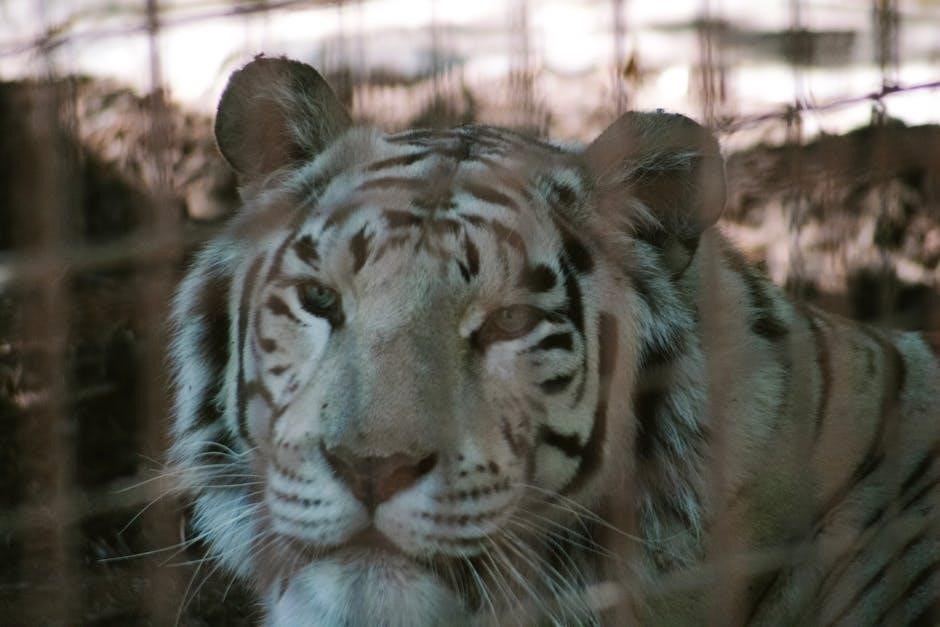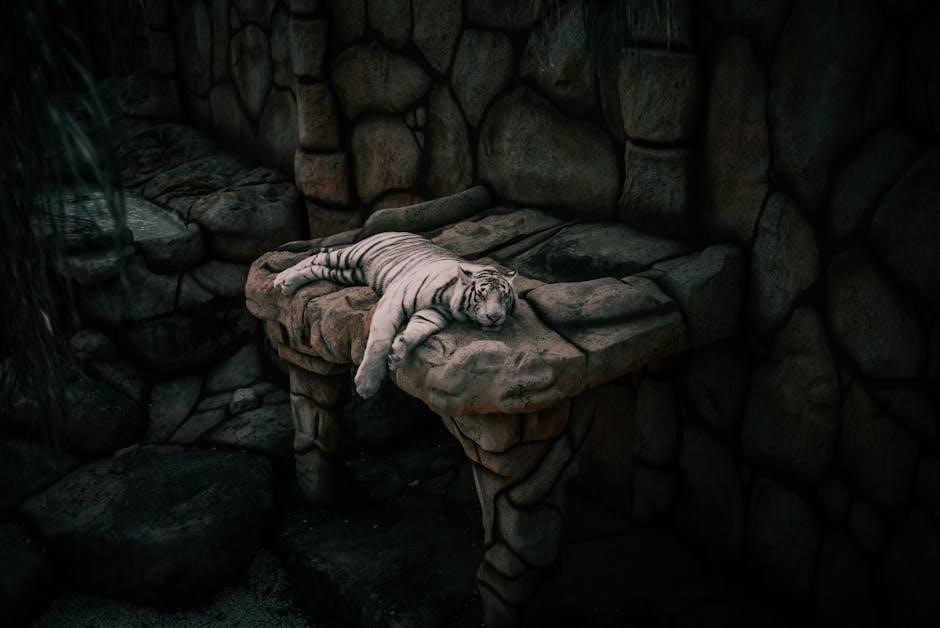Bengal Tiger at the Baghdad Zoo: An Overview
Rajiv Joseph’s Bengal Tiger at the Baghdad Zoo, a Pulitzer Prize finalist, blends dark humor and surreal drama amidst the Iraq War. The play follows interwoven lives, featuring a tiger haunting Baghdad, seeking meaning, and questioning conscience. It explores the power and perils of human nature.
Rajiv Joseph and the Play’s Genesis
Rajiv Joseph, the author of Bengal Tiger at the Baghdad Zoo, is a celebrated playwright known for his darkly comic and thought-provoking works. Before achieving widespread recognition with this particular play, Joseph had already penned several other notable pieces, including All This Intimacy, Animals Out of Paper, and Gruesome Playground Injuries, showcasing his diverse range and talent for exploring complex themes.
The genesis of Bengal Tiger at the Baghdad Zoo stemmed from Joseph’s interest in exploring the human condition amidst the chaos and absurdity of the Iraq War. He sought to create a narrative that delved into themes of war, morality, redemption, and the afterlife, using the unique perspective of a tiger in the Baghdad Zoo as a lens through which to examine these issues. His artistic partnership with Center Theatre Group significantly contributed to the play’s development, culminating in its world premiere at the Kirk Douglas Theatre in 2009.
Joseph’s inspiration drew from the historical context of Baghdad in 2003, during the early days of the Iraq War, allowing him to explore the impact of conflict on both individuals and society. The play’s success led to numerous accolades, including a Pulitzer Prize finalist nomination in 2010 and a subsequent Broadway debut in 2011, solidifying Joseph’s position as a leading voice in contemporary American theater.

Synopsis: War, Redemption, and a Tiger’s Quest
Bengal Tiger at the Baghdad Zoo unfolds amidst the turmoil of the 2003 Iraq War, centering around a Bengal tiger held captive within the confines of the Baghdad Zoo. This tiger, far removed from its natural habitat, becomes an unlikely narrator, observing the absurdities and horrors of war with a unique perspective. The play interweaves the lives of two American Marines, Tom and Kev, and an Iraqi translator named Musa, forever changed by their encounter with the tiger;
The narrative explores themes of war, morality, and the search for meaning in a world filled with violence and chaos. As the tiger witnesses the destruction and suffering around him, he embarks on a quest for understanding, seeking answers to profound questions about life, death, and the human condition. The characters grapple with guilt, betrayal, and the desire for redemption, navigating a landscape haunted by ghosts and riddles.
The quest for a golden toilet seat becomes a symbolic element, representing greed, corruption, and the misplaced priorities of those involved in the conflict. Ultimately, the play examines the power and perils of human nature, questioning the capacity for both cruelty and compassion in the face of adversity. It is a darkly comic yet poignant exploration of the human spirit amidst the ruins of war-torn Baghdad.
Characters and Their Interwoven Lives
Bengal Tiger at the Baghdad Zoo features a cast of characters whose lives become intricately connected against the backdrop of the Iraq War. The Bengal Tiger, a philosophical and surprisingly articulate animal, serves as the play’s narrator and a central observer. He grapples with existential questions, providing a unique perspective on the events unfolding around him;
Tom and Kev, two American Marines, represent the human cost of war. Tom is haunted by his actions and seeks redemption, while Kev struggles with the psychological trauma of his experiences. Their lives intertwine with Musa, an Iraqi translator who once worked for Uday Hussein. Musa is burdened by his past and seeks to reconcile his loyalty to his country with the realities of the occupation. He’s also haunted by Uday’s ghost.
As the play progresses, the characters’ paths converge, leading to unexpected alliances and betrayals. Their individual stories become interwoven, highlighting the shared human experience of loss, guilt, and the search for meaning. The tiger acts as a catalyst, prompting the characters to confront their inner demons and question their beliefs. Through their interactions, the play explores the complexities of human relationships in a time of conflict, demonstrating how war can both break and forge bonds between individuals from different backgrounds.
Themes: War, Morality, and the Afterlife
Rajiv Joseph’s Bengal Tiger at the Baghdad Zoo delves into profound themes of war, morality, and the afterlife, using the chaotic setting of the Iraq War as a backdrop. The play critiques the absurdity and brutality of war, showcasing its devastating impact on both individuals and societies. Through its characters, the play explores the moral ambiguities of conflict, questioning the justifications for violence and the consequences of unchecked power.
The play also grapples with questions of morality, examining the characters’ choices in a morally compromised environment. Tom, haunted by his actions, embodies the struggle with guilt and the search for redemption. The tiger’s philosophical musings force the audience to confront their own moral compass. The theme of the afterlife is explored through the presence of ghosts, blurring the lines between the living and the dead. These spectral figures serve as reminders of past transgressions and the enduring consequences of violence.
Ultimately, Bengal Tiger at the Baghdad Zoo uses its unique narrative to prompt reflection on the human condition, challenging audiences to consider the complex relationship between war, morality, and the search for meaning in the face of death.

Broadway Production and Robin Williams’ Role
Bengal Tiger at the Baghdad Zoo made its Broadway debut at the Richard Rodgers Theatre, marking a significant moment for Rajiv Joseph’s acclaimed play. The production was notable for featuring Academy Award winner Robin Williams in the title role of the Bengal Tiger, marking his Broadway acting debut. Williams’ portrayal of the philosophical tiger was highly anticipated, bringing his unique comedic timing and dramatic depth to the character.
The Broadway production was directed by Moises Kaufman, further adding to the prestige of the show. The play opened on March 31, 2011, and ran through July 3, 2011. Williams’ presence undoubtedly contributed to the play’s visibility and drew audiences eager to see his interpretation of the complex character. Critics noted Williams’ ability to embody the tiger’s questioning conscience, bringing both humor and pathos to the role.
The Broadway staging allowed for a wider audience to experience Joseph’s powerful play, further cementing its place in contemporary American theatre. The production highlighted the play’s themes of war, morality, and redemption, leaving a lasting impression on audiences and critics alike.

Critical Reception and Awards
Bengal Tiger at the Baghdad Zoo garnered significant critical attention, ultimately becoming a Pulitzer Prize finalist in 2010, a testament to Rajiv Joseph’s powerful writing and the play’s impactful themes. The play was also nominated for a Tony Award, further solidifying its recognition within the theatrical community. The National Endowment for the Arts recognized the play with an award for Outstanding New American Play.
Critics lauded the play’s unique blend of dark humor and surreal drama, praising Joseph’s ability to explore complex issues of war, morality, and the afterlife through the lens of a talking tiger. Robin Williams’ performance in the Broadway production was also widely praised, with many critics highlighting his ability to bring both comedic timing and emotional depth to the role.
While the play received overall positive reviews, some critics noted the challenges of balancing the play’s comedic and tragic elements. Nevertheless, the play’s critical success and numerous awards nominations underscore its significant contribution to contemporary American theatre and its lasting impact on audiences.
The Play’s Setting: Baghdad During the Iraq War
Bengal Tiger at the Baghdad Zoo is deliberately set in Baghdad during the early days of the Iraq War in 2003. This specific time and location are crucial to the play’s themes and its exploration of the human condition amidst conflict. The war-torn city serves as a backdrop of chaos and uncertainty, reflecting the characters’ internal struggles and moral dilemmas. The physical environment of Baghdad, with its ruins and pervasive sense of danger, mirrors the psychological landscape of the characters, who are grappling with trauma, guilt, and the search for meaning in a seemingly senseless world.
The Baghdad Zoo itself becomes a symbolic space within the play, representing captivity, displacement, and the disruption of the natural order. The presence of the tiger, far removed from its natural habitat, underscores the broader themes of alienation and the loss of identity that permeate the play. The setting also allows Joseph to explore the cultural clashes and misunderstandings that arise during wartime, highlighting the complexities of human interaction in a conflict zone.
Symbolism and Motifs in the Play
Bengal Tiger at the Baghdad Zoo is rich in symbolism and recurring motifs that deepen its exploration of war, morality, and the human condition. The tiger itself serves as a central symbol, representing both the untamed aspects of human nature and the displaced, suffering soul caught in a world of violence. The golden toilet seat, a seemingly absurd object, becomes a motif for misplaced values and the corrupting influence of greed amidst the chaos of war. Its acquisition and the characters’ obsession with it highlight the moral decay that can occur in such environments.
Ghosts are another significant motif, representing the lingering effects of trauma and the unresolved past. The ghosts that haunt the characters serve as constant reminders of their actions and the consequences of war, blurring the lines between the living and the dead. Gardens and the act of gardening also appear, symbolizing the potential for growth, healing, and the restoration of order in a shattered world. The recurring presence of these symbols and motifs enhances the play’s thematic complexity, inviting audiences to contemplate the deeper meanings embedded within the narrative.
Producing the Play: Licensing and Author Credit
For those interested in staging a production of Bengal Tiger at the Baghdad Zoo, securing the necessary performance rights is a crucial first step. Dramatists Play Service, a well-established play-licensing agency, handles the rights to this work. Obtaining a license ensures that the production is legally compliant and respects the playwright’s intellectual property. The licensing agreement will outline the terms and conditions for performance, including royalty fees and performance schedules;
Equally important is providing proper credit to Rajiv Joseph as the sole and exclusive author of the play. This acknowledgement must appear on the title page of all programs distributed in connection with the performances. Furthermore, any advertising, publicity materials, or other forms of promotion for the production must clearly state Rajiv Joseph’s authorship. Adhering to these requirements is a professional courtesy and a legal obligation, recognizing the playwright’s creative contribution and ensuring the integrity of the work.

Adaptations and Related Works
While Bengal Tiger at the Baghdad Zoo is primarily known as a stage play, its themes and narrative have resonated in other artistic forms. “Bengal Tiger at the Baghdad Zoo: Musas Grief” exists as a video adaptation, offering a visual interpretation of Musa’s experiences and the ghosts that haunt him amidst the backdrop of the Iraq War. This adaptation provides an alternative lens through which to examine the play’s complex characters and moral questions.
Furthermore, the play’s exploration of war, morality, and the human condition connects it to a broader body of works dealing with similar themes. Other plays, films, and literature that grapple with the Iraq War and its impact on both American soldiers and Iraqi civilians can be considered related works. Exploring these connections can provide a richer understanding of the play’s significance within the context of contemporary art and culture. The play’s exploration of absurdities of war continues to inspire creative interpretations.
